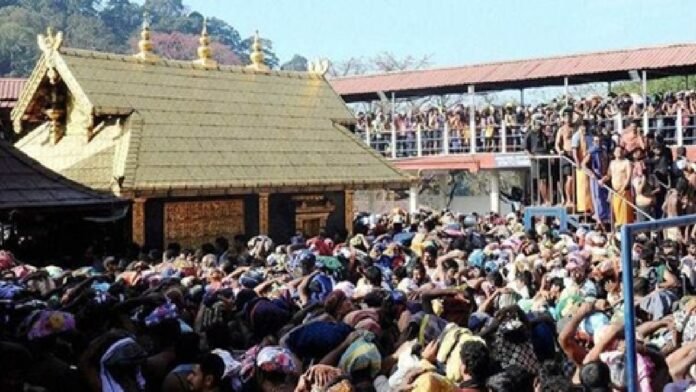Recently, when the Supreme Court said that women have the fundamental rights to enter Sabiramala temple, it sent across the hopes to millions of women in the country that like men, they too have inalienable right to enter temple and worship the God. The apex court had observed that banning the entry of women in Sabarimala temple is unconstitutional and questioning the rationale behind banning the entry of women in the 10-50 age group, it said menstruation may begin before the age of 10 and menopause may hit women much earlier.
The Ayyappa temple in Sabarimala, Kerala, prohibits women of menstruating age (between ten and 50 years of age) from entering it – a prohibition enforced under Rule 3(b) of the Kerala Hindu Places of Public Worship (Authorisation of Entry) Rules, 1965: “Women who are not by custom and usage allowed to enter a place of public worship shall not be entitled to enter or offer worship in any place of public worship.”
Our constitution does not permit discrimination on the basis of caste, religion, language and sex. But, the social reality is widely different from what the constitution ideally wants the country to be. Thhe discrimination not only occurs at the individual level or at the level of the family, but also at the organisational level. Kerala’s famous Sabarimala is the best example of the latter where women in the age group of 10-50 have been denied temple entry. For decades there have been demands to remove the restrictions based on age-old stereotypes and patriarchal thoughts. The apex court has taken a strong exception to the reason for denying women’s entry into Sabarimala. It said when men can enter the temple, women too cannot be denied the same, stating that it is their constitutional right to enter the temple.
Depriving a person any opportunity on the basis of sex is unconstitutional. The recent court’s ruling is a reminder to his fact. But, despite the constitutional safeguards, women have been denied entry into Sabarimala temple for decades. There are basically two reason for it. Firstly, the giving religious sanctity to traditional beliefs about religious rites and rituals. Secondly, our constitution also talks about religious autonomy. But with time the traditional rules began to be challenged and the demand for women’s entry into Sabarimala temple intensified. As a result, in 2015, the state government supported the demand for entry of women in the Sabarimala temple, but in 2017 the government opposed the same demand. Considering the Sabarimala issue as very important matter, last year the Supreme Court referred it to five judge constitutional bench. There were two other similar issues- one of Shani Singnapur temple and the other of Dargah Ali. Women were denied entry into these religious places as well.
Earlier, when Bombay High Court was hearing whether women should be allowed entry into religious places, the trust of these religious places contended that it was an age-old tradition and it should not be interfered with. But the court upheld ‘the fundamental rights of women, the right to equality and the right to freedom of worship’. It said no law bars entry of women in the places of worship, and hence no gender discrimination in this regard should be tolerated. Similarly, the Supreme court upholding the right to equality paved the way for women’s entry first into Shani Shingnapur temple and then into Dargah Ali. And now, Supreme Court has reiterated the same for Sabarimala temple. It should therefore be clear that even if constitution provides autonomy to religious institutions, there is a limit to it. It cannot come in the way of a larger constitutional safeguard, i.e the right to equality. The difference between these two rights should always be kept in mind so that rites and rituals based on the traditions should not neglect the social equality and the rights of the citizens.















